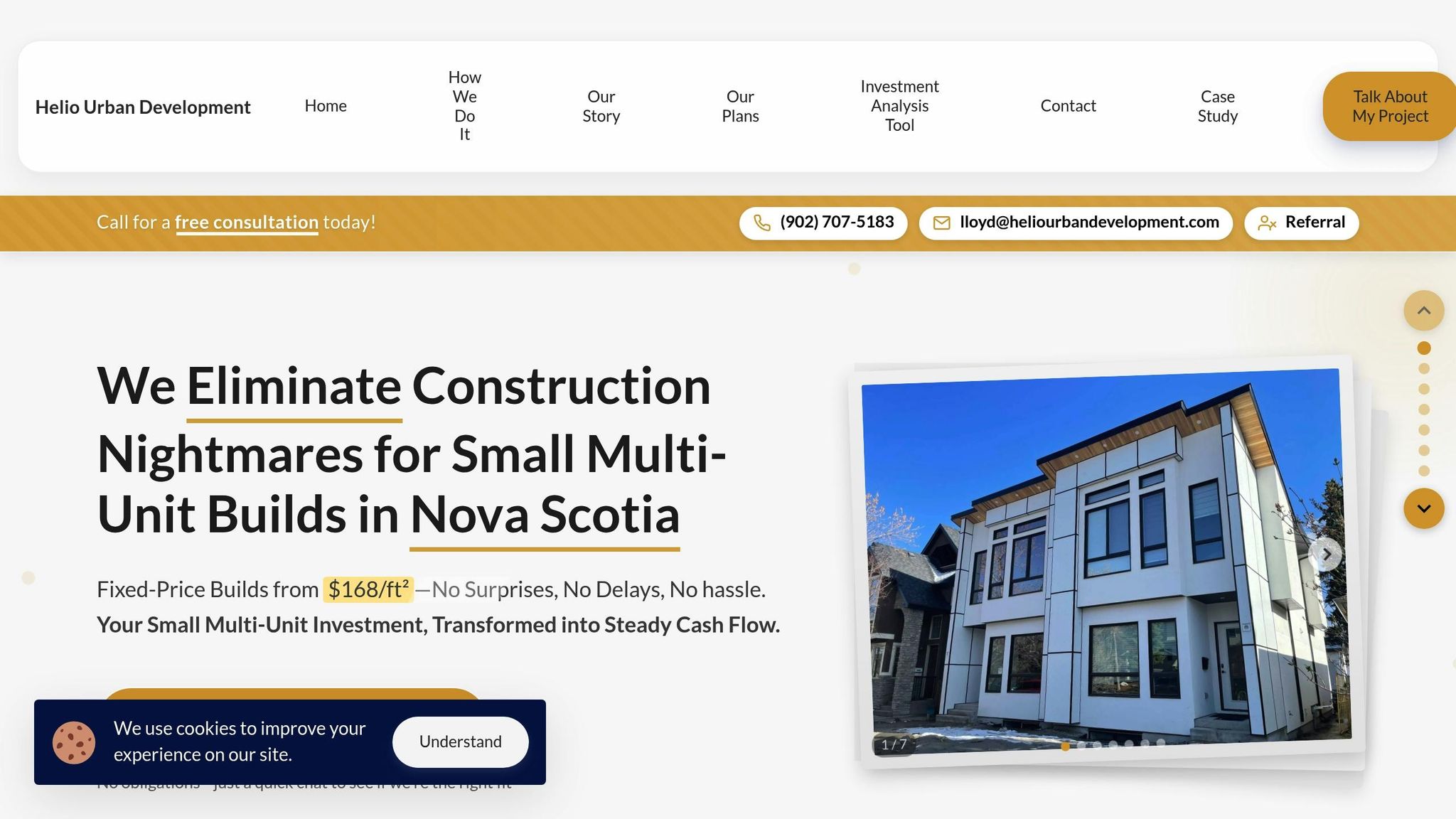Nova Scotia Building Code: Material Durability Standards
Nova Scotia's Building Code ensures buildings are safe, durable, and energy-efficient, especially in the province's tough coastal climate. Here's what you need to know:
- Durability Standards: Multi-unit buildings must use materials that resist harsh weather, improve safety, and reduce maintenance costs.
- Key Requirements: Structural wood (50-year durability), concrete (32 MPa), and steel (350W grade) must meet CSA certifications.
- Energy Efficiency: Walls need R-22 insulation, roofs R-49, and windows must meet U-1.8 W/m²K standards.
- Cost Insights: Construction costs range from $168 to $220 per square foot. Using compliant materials at $168/sq. ft. can save developers money while maintaining quality.
Meet Joe Rogers, Building Code Coordinator for The Nova ...
Nova Scotia Material Standards
Nova Scotia's building code outlines strict material requirements designed to address the province's unique coastal climate. These standards ensure that local construction aligns with both national regulations and the specific needs of the region.
National Code Integration
Nova Scotia's building code incorporates national standards while addressing local conditions. It specifies the use of CSA-certified materials for critical components, as shown below:
| Component Type | Certification Required | Minimum Performance Rating |
|---|---|---|
| Structural Wood | CSA O86 | 50-year durability |
| Concrete Mix | CSA A23.1 | 32 MPa for foundations |
| Steel Members | CSA S16 | G40.21 350W grade |
Weather Protection Requirements
To ensure durability in coastal areas, the code includes specific weather protection measures:
- Exterior Cladding: Must withstand wind-driven rain loads of 1.2 kPa.
- Window Systems: Require a minimum DP-50 rating for properties located within 1 km of the coastline.
- Roof Materials: Must have a Class C or higher wind resistance rating.
Energy Standards
Energy efficiency is a key focus, with material requirements aimed at improving the building envelope. Current standards include:
| Building Element | Requirements |
|---|---|
| Exterior Walls | RSI 3.85 (R-22) with continuous insulation |
| Attic/Roof | RSI 8.67 (R-49) with a vapour barrier |
| Windows | U-1.8 W/m²K with Low-E coating |
These guidelines are designed to balance durability and energy efficiency, ensuring that buildings meet the demands of Nova Scotia's environment while promoting sustainable construction practices.
Material Requirements by Type
The Nova Scotia Building Code emphasizes strong roof durability and effective water protection, especially for multi-unit properties in coastal areas. These rules reflect the region's specific challenges, such as harsh weather and the need for energy efficiency.
Key roofing system requirements include:
- Water-resistant membranes to guard against moisture infiltration.
- Roof slopes designed to ensure proper drainage.
- Flashing installed correctly at all penetrations to prevent leaks.
- Ice dam prevention measures to address issues caused by freezing temperatures.
sbb-itb-16b8a48
Meeting Code Requirements
Meeting Nova Scotia's durability standards involves thorough inspections, testing, and obtaining the necessary permits. Here's a breakdown of the key steps involved.
Inspections and Testing
Inspections focus on ensuring the quality of materials and the methods used during installation. Inspectors carefully evaluate:
- Foundation materials: Concrete strength and proper placement of reinforcements
- Structural components: Verification of lumber grades and quality of engineered wood
- Building envelope: Proper installation of vapour barriers and insulation
- Roofing systems: Membrane installation and flashing details
For multi-unit buildings, inspectors also check fire-rated assemblies and soundproofing between units. Party walls must have a minimum fire-resistance rating of 45 minutes, while floor assemblies require at least a 1-hour rating.
Non-Standard Materials
If alternative materials are used, they must be approved to ensure compliance. The process includes:
- Submitting documentation: Provide specifications and testing reports.
- Performance verification: Show evidence of durability in similar climates.
- Engineering review: Obtain a professional assessment of the material's suitability.
This approval process, handled by the local building authority (AHJ), usually takes 4–6 weeks. Alternative materials must prove they perform as well as or better than traditional ones.
Required Permits
Permits are essential for multi-unit projects, especially when using specific materials or methods. Below is an overview of the key permits:
| Permit Type | Purpose | Typical Processing Time |
|---|---|---|
| Material Compliance | Verify primary building materials | 10–15 business days |
| Special Assembly | Approve non-standard construction methods | 20–25 business days |
| Fire Rating | Ensure fire-resistant materials and designs | 15–20 business days |
To secure these permits, detailed documentation is required, including:
- Complete material schedules
- CSA certifications for major components
- Technical data sheets for specialized products
- Installation specifications
- Quality control procedures
Once permits are issued, regular site inspections are scheduled at critical construction stages. Inspectors typically need 48 hours' notice to arrange these reviews.
Multi-Unit Property Guidelines
Cost vs. Durability
When building multi-unit properties, it's essential to balance material durability with budget considerations. In Nova Scotia, the average construction cost sits at approximately $220 per square foot. Choosing the right materials within this range can significantly impact both cost and quality. Companies like Helio Urban Development offer fixed-price contracts starting at $168 per square foot, which shift the risk of cost overruns to the builder while ensuring compliance with building codes. By using an integrated team approach, they streamline compliance processes and minimize delays - an approach that has proven effective in recent projects [1].
Sample Project Materials
For example, a 3,200-square-foot duplex in Colchester achieved full code compliance at a cost of $165 per square foot and was appraised at $830,000 [1].
Helio Urban Development Services

Helio Urban Development takes a comprehensive approach to ensure materials meet required standards. Their pre-approved material selections not only comply with but often exceed Building Code requirements, reducing the risk of delays and maintaining high-quality outcomes.
"Having a guaranteed price was everything for my first project. Helio took me from day-one design through lease-up, all without the hidden costs I dreaded. I couldn't have asked for a smoother introduction to development." – Michael T., New Developer [1]
Their services include:
-
Standardized Materials
Pre-selected materials help ensure a consistent construction schedule and reliable quality. -
Quality Control
In-house engineering teams oversee installations to meet durability expectations. -
Cost Management
Fixed-price contracts safeguard against unexpected cost changes. For instance, a recent four-unit project was completed at $173 per square foot, with all units pre-leased and generating $9,600 in monthly rental income [1].
Conclusion
The Nova Scotia Building Code's focus on material durability plays a key role in ensuring construction safety and maintaining property value over time. Following these standards allows developers to construct buildings that can handle the province's tough climate conditions.
For example, data indicates that using materials priced at $168 per square foot - compared to the $220 industry average - can result in equity gains of up to $166,400 while still meeting all required standards [1].
Additionally, code-compliant buildings offer strong financial advantages. Developers and investors have seen returns on equity as high as 262% at refinance, compared to 116% when using average construction methods [1].
